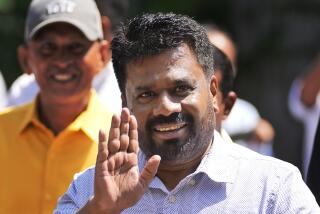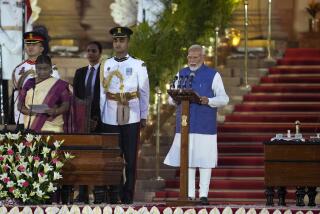Voters Point India to New Path
- Share via
NEW DELHI — Voters by the hundreds of millions have fixed India’s course toward the 21st century, and initial signs Tuesday were that for the first time, they have made a Hindu nationalist party the greatest political force in the land.
The governing Congress (I) Party of Prime Minister P.V. Narasimha Rao, architect of 5-year-old reforms that have opened India to foreign capital and business to an unprecedented extent, decisively lost its majority in Parliament, exit polls indicated.
With the party besmirched by a series of corruption scandals that reached into Rao’s Cabinet, Congress’ share of parliamentary seats and of the popular vote--about 30%--was its lowest since parliamentary elections began in 1951, the polls showed.
“This demonstrates that the Congress has lost its mandate with the people,” said Lal Krishna Advani, president of the Bharatiya Janata Party, which apparently has succeeded Congress as the largest party in India’s Parliament.
However, the exit polls, conducted by Doordarshan state television, indicated that none of the three major political forces in the world’s most populous democracy won an outright majority, meaning a coalition government would be inevitable.
With or without Rao, Congress could remain in power if it can cobble together a governing alliance with other parties, something it has never done in its 44 1/2 years at the head of the Indian state. The BJP would find coalition-building harder to do, as many other parties shun its avowed use of Hinduism, India’s majority faith, for political ends.
“By all means, other parties will try to keep the BJP from forming a government,” predicted former Prime Minister Vishwanath Pratap Singh, who headed the left-wing Janata Dal government in 1989-90.
Rao’s home affairs minister, S.B. Chavan, said, “I feel we will form the government on our own, but if needed, we can seek the support of secular parties based on principles.”
The exit surveys, aired right after polls closed at 5 p.m., indicated that in 535 of the 543 electoral districts of the Lok Sabha, the more powerful lower house of India’s bicameral Parliament, the BJP won 192 and Congress 142.
In 134 other districts, the Janata Dal and its left-wing and low-caste allies triumphed. Candidates from other parties, mostly members of breakaway Congress factions, won in 67 others, the polls found.
The 74-year-old Rao spent much of Tuesday at Tirupati, a temple complex in his native state of Andhra Pradesh. He returned to New Delhi in the evening and will certainly face increased calls for his removal from the party’s helm.
Congress had 269 seats in the outgoing Lok Sabha, and Rao’s five-year tenure as prime minister and party president that began after the 1991 assassination of Rajiv Gandhi was already contested by many erstwhile Congress comrades.
Asked if rebels would now be welcomed back into Congress to stave off a possible BJP-led government, Chavan said, “A decision in the matter can be taken by the Congress Working Committee.”
According to the Election Commission, a record 335 million Indians cast ballots in the three-stage process that began April 27.
A third of India’s 590 million voters were eligible to cast votes Tuesday. Counting of all ballots starts today and could take two days.
Across India, at least 75 people--most in the troubled northeastern state of Bihar--have been killed in election-related violence since campaigning began last month. In the last general election, five years ago, about 300 people lost their lives.
Tuesday also witnessed the first voting in Jammu and Kashmir in nearly seven years. Despite a boycott call from Kashmiri separatists, turnout was 55% in the mostly Hindu Jammu-Poonch district and 80% in predominantly Buddhist Ladakh, state Chief Secretary Ashok Kumar reported.
Lok Sabha elections in the state’s mostly Muslim areas are to be held May 23 and 30.
More to Read
Sign up for Essential California
The most important California stories and recommendations in your inbox every morning.
You may occasionally receive promotional content from the Los Angeles Times.










